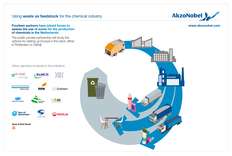- The consortium has grown to 14 partners since its launch last year.
- The aim is to use waste to produce methanol and ammonia.
- A study on setting up Europe's first plant in Rotterdam or Delfzijl will be published later this year.
- Enerkem's technology converts waste into synthesis gas for chemical production.

Consortium Expansion
A major Dutch initiative focused on converting waste into chemicals has significantly expanded since its inception late last year. Initially formed by AkzoNobel, Enerkem, and four regional partners, the consortium now includes eight additional commercial entities.
Technological Goals
The primary objective is to utilize Enerkem’s technology to produce synthesis gas from domestic and other waste, which can then be used as a feedstock for manufacturing chemicals such as methanol and ammonia. This approach aims to provide a sustainable and cost-effective source of raw materials for the chemical industry.
Feasibility Study
The public-private partnership is conducting a study to explore the feasibility of establishing Europe’s first waste-to-chemicals plant, with potential locations in Rotterdam or Delfzijl. The results of this study are expected to be published later this year.
New Partners
The latest organizations to join the consortium include Van Gansewinkel, EEW Energy from Waste, BioMCN, Air Liquide, Veolia, Visser & Smit Hanab, the Port of Rotterdam Authority, and DNV GL. These new partners bring additional expertise in waste collection, conversion, industrial plant operations, and sales, further strengthening the initiative.
Waste as a Resource
Enerkem's CEO, Vincent Chornet, emphasized that waste is an abundant and low-cost unconventional feedstock that can be effectively used to produce chemicals. He highlighted that Enerkem's process is fully compatible with existing waste infrastructure, making it a practical solution for converting waste into valuable chemical products.

